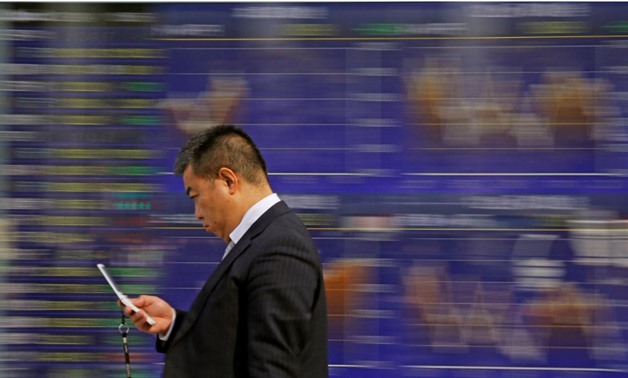
A man walks past an electronic stock quotation board outside a brokerage in Tokyo, Japan, February 9, 2018. REUTERS/Toru Hanai
SYDNEY - 6 September 2018: Asian shares skidded for a sixth straight session on Thursday, oil slipped and safe-haven gold gained with investor confidence shaken by turmoil in emerging markets and jitters over a potentially severe escalation in the U.S.-China trade war.
European shares were expected to be subdued too with futures for Eurostoxx 50 STXEc1, Germany’s DAX FDXc1 and London’s FTSE FFIc1 all starting lower.
MSCI’s broadest index of Asia-Pacific shares outside Japan .MIAPJ0000PUS dropped more than 1 percent to hit a one-year trough of 515.24 points.
Japan's Nikkei .N225 slipped 0.4 percent while Australian shares faltered 1.1 percent.
China's blue-chip index .CSI300 fell 1.2 while Hong Kong's Hang Seng index .HSI stumbled 1.5 percent.
Investors were on edge with a public consultation period on the Trump administration’s intent to impose tariffs on an additional $200 billion of Chinese goods ending on Thursday.
U.S. President Donald Trump said on Wednesday that the United States was not yet ready to come to an agreement over trade disputes with China but he said talks would continue.
“An escalation of the U.S.-China trade war may be imminent, the timing is somewhat unclear and this justifies caution even given the (U.S. dollar) pullback,” JPMorgan analysts said.
Measured against a basket of currencies, the dollar index .DXY retreated from two-week highs hit earlier this week to stand flat at 95.16.
“Conviction and participation will likely remain light until an announcement,” they said.
Further weighing on sentiment, data out earlier showed German industrial orders fell unexpectedly in July in another sign that factories in Europe’s largest economy are feeling the bite of protectionist trade politics.
The euro was a tad softer at $1.1624.
Investors are also watching for developments as the United States and Canada resume talks about revamping the North American Free Trade Agreement. Canada insisted there was room to salvage the pact despite few signs a deal was imminent.
The dollar, considered a safe haven at times of turmoil because of its status as the world’s reserve currency, has generally benefited from these trade uncertainties. It has gained 8 percent since end-March, with currencies in emerging markets taking a hammering.
PAUSE, NOT PANACEA
The financial crises in Argentina and Turkey have sent shivers through emerging markets while in Indonesia the central bank has had to intervene several times in recent weeks to stem the rupiah currency’s slide.
Indonesia's benchmark stock index .JKSE was last up 0.1 percent while the rupiah also gained a tad.
An index of emerging market currencies .MIEM00000CUS paused near 15-month lows after two straight days of heavy declines.
But analysts warned about further losses as investors were no longer looking at Argentina, Turkey and South Africa as isolated cases. They are fretting over the impact of rising U.S. inflation and interest rates on heavily indebted Asian economies.
“The upshot is that this pause should not be mistaken for a panacea to the ongoing emerging market crisis, which demands utmost policy vigilance; and perhaps coordination,” analysts at Mizuho said in a note.
The emerging market equity index .MSCIEF has been crunched in the past month or so, falling for six consecutive sessions and down more than 3 percent this week.
Analysts at Capital Economics believe there is room for further declines.
A range of factors have hit EM stocks recently, namely policy tightening by the U.S. Federal Reserve, crises in Turkey and Argentina, the Sino-U.S. trade war and broader concerns about China’s economy.
“We doubt that the main factors which have caused equities across much of the emerging world to weaken together recently will go away just yet,” Capital Economics said in a note.
Elsewhere, sterling GBP= held on to gains made on Wednesday as investors positioned for a favourable Brexit outcome. It was last up 0.1 percent at $1.2910.
In commodities, oil prices fell as emerging market woes weighed on sentiment. U.S. crude CLcv1 eased 14 cents to $68.58 a barrel while Brent LCOcv1 was last down 7 cents at $77.21.
Gold was stronger with spot gold XAU= up 0.1 percent at $1,197.33 an ounce.

Comments
Leave a Comment